Sunday, October 31, 2021. Micalyn’s eightieth birthday.
A week ago, I texted my friend Sandy:
I had a reasonable day, but I felt lonely.
It’s so damn frustrating to have lost my best friend, Micalyn. Whenever I think of something I will want to tell her the next time I see her, reality comes crashing down on me. I will never see her again. All that love for her, and she’ll never get any of it again.
The following day, Sandy wrote:
Before you mentioned that you were lonely, I was quite worried that you were. All that dealing with M’s estate kept you busy, but not on your walks, not when you were cooking and eating. Where was your lovely girl?
Don’t you feel like talking to her? Please do so.
Me:
Sandy, I can’t talk to her at the moment. Whenever I try, I break down in tears.
Whenever I look at her piano and know that I will never hear her playing again, I break down in tears.
Whenever I see, on the dresser, the Halloween/birthday card I got her in September because I knew she would never see Halloween, her birthday, again, I break down in tears.
All I want to do is cradle her in my arms and tell her, “Oh, my poor darling! Oh, my poor darling!” I break down in tears. I know I can never tell her anything again.
Sandy:
Then talk to me. Tell me about the friends you have seen and texted with recently and every new thing that comes your way.
A good suggestion, but Sandy had raised a possibility in my mind. Did I want to talk to Micalyn? Should I? Could I talk with her in any way? Would it do any good?
I decided that rather than talk to her directly, I would imagine talking with her. The distinction is subtle, I admit, but the point was that I was not going to try to hallucinate her; I was going to keep one foot in reality while I probed fantasy with a toe of the other.
The result was startling. I’d imagined that I could talk to her, but before I could speak, she spoke to me.
She said, gently, “What are you doing, Louis? I’m dead.”
“I was imagining talking with you. It’s your birthday.”
“But, to what end? You know I’m dead. You’re making this up. I’m not here. I can’t speak. I can’t do anything. I don’t do anything. All that is left of me is in that tasteful and unobtrusive black box in the closet.”
“I wanted to talk with you. Stuff I want to share with you. Stuff I knew you’d be interested in.”
“Of course you do. If I existed at all, you know I’d be interested. But you are having this conversation with yourself, not with me, Micalyn. You know that I loved you, but I don’t, can’t, love anything now, because I don’t exist.”
I started crying.
She continued, “When I was still alive, I told you not to cry, but I thought better of it. You had to cry for me. I know it. No, I don’t know. I don’t know anything, now. You know I knew it. You know I knew you had to cry for me while I was alive. But now, I’m gone. Not gone away, just gone. I’m the woman by the side of the river. You have to leave me there and continue your voyage.
“That doesn’t mean you have to forget me. You will always remember me, as I remembered you until my death. Now, there is no remembering for me. I am not.
“You said that you would love me forever, and you knew even when you said it and wrote it that it could not be literally true. You can love me until you die. That is easy to believe. I loved you until I died. But I can’t even say that. Only you can say it for me, and all you can say is that you know that I loved you until I died and then, finis, the end, nevermore.
“You’re the psychologist, and you are just telling yourself this. Good. It was time for the full implications of this–what you imagine me saying–to occur to you. If it took conjuring me up to prod you into analyzing your situation more closely, you know I would have been glad to be up-conjured. You know I would have been willing to help you in any way. You know you were my best friend. And my best lover. And my everything.
“You know I wanted you to remember me and celebrate my life. It is all you have left, but for all that, it is a rich and wondrous heritage. And you will revel in it for as long as you continue to live.”
Well, that was not at all what I had expected when I set out to imagine Micalyn on her birthday. It activated my “inner therapist” and got me to do some important work on my grieving. I have been mired in memories of how she suffered, as if she were suffering still, right now. I still have the memories, but I have reminded myself that her actual suffering ended with her death. And that, oddly enough, is a great relief.
It’s all in how you hold it.
Let’s see what that does for me, going forward. At the very least, it will get me through today, Halloween / her birthday, on a more even keel.

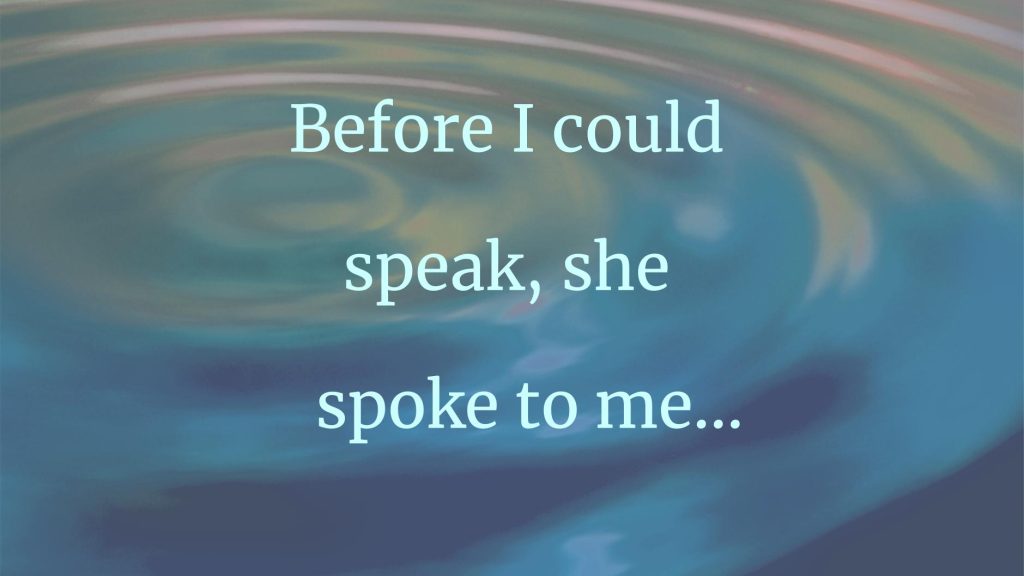
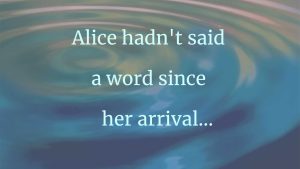
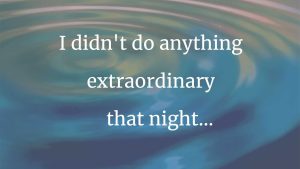
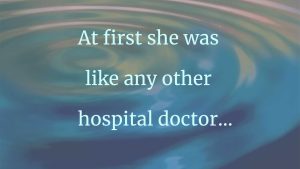
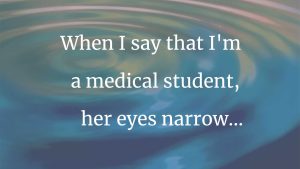
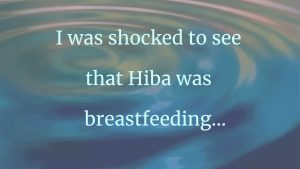
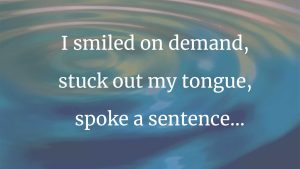
5 thoughts on “A Conversation With My Dead Wife”
Thank you for your story. I have conversations too, at the bottom of my stairs, right next to my dad’s piano, now long gone to neglect. He’s been gone a long time, since I was almost two years old, in a plane crash, and I’m no longer what you could call young. He was thirty-four.
I like to imagine that he stopped me that day, the eager young man in the portrait that sits on top, but I know better. It’s my fervent desire to know him, to be able to remember him, that I’ve had all my life. I’ve done what I can think of to know him and his story, from grilling relatives, interviewing his elderly boss, visiting his childhood haunts, researching his plane crash (which revealed that this new model eventually accounted for 89 deaths before it was grounded), sitting in the last remaining example of the plane on display anywhere, and more. Each effort has paid off, some have been transformative.
It’s no surprise that I chose a career as a therapist, where I saw my clients begin to befriend their grief instead of fear it. It seems the best route to healing. I know it’s worked for me.
Trauma experts say that my unremembered relationship with my father and his loss is imprinted in my body but I’ve had no success yet in decoding that. So now I talk to Dad, out loud, softly, when no one else is home.
I wept as I read, as I felt your heart crying.
Thank you for sharing this poignant dialogue.
I read this story with tears. So special to move through grief this way with words of gratitude and sadness. May you continue to grow and prosper and find love and friendship by your side.
Sorry for your loss, and glad you are finding a way to process your grief. Remembering people we love who have died seems to be not just the best way to keep them alive to us, but it is a way for us to keep on living when we might otherwise withdraw. Thank you for sharing your story, Dr. Cutrona; it provides hope and a pragmatic strategy in the face of what awaits all of us.
What a love this must have been! And what a moving essay.